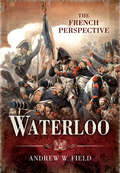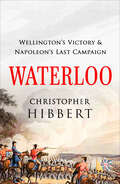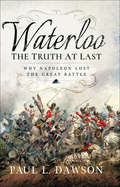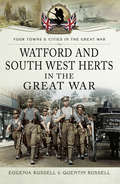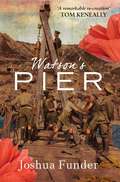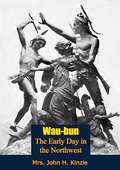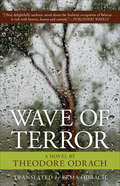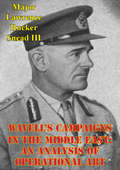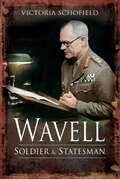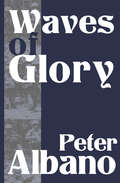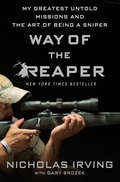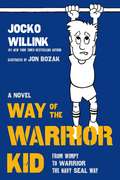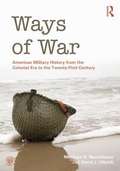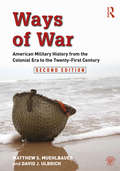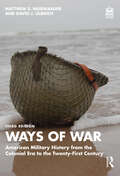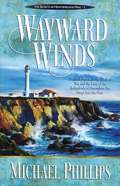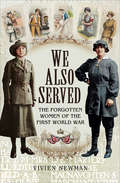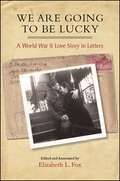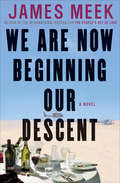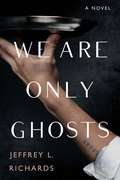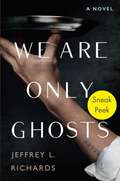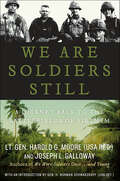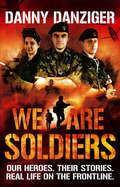- Table View
- List View
Waterloo: The French Perspective
by Andrew W. FieldFrom the author of Talavera, an extensive history of the Battle of Waterloo from the losing side&’s point of view. The story of the Battle of Waterloo—of the ultimate defeat of Napoleon and the French, the triumph of Wellington, Blücher, and their allied armies—is most often told from the viewpoint of the victors, not the vanquished. Even after 200 years of intensive research and the publication of hundreds of books and articles on the battle, the French perspective and many of the primary French sources are under-represented in the written record. So, it is high time this weakness in the literature—and in our understanding of the battle—was addressed, and that is the purpose of Andrew Field&’s thought-provoking new study. He has tracked down over ninety first-hand French accounts, many of which have never been previously published in English, and he has combined them with accounts from the other participants in order to create a graphic new narrative of one of the world&’s decisive battles. Virtually all of the hitherto unpublished testimony provides fascinating new detail on the battle and many of the accounts are vivid, revealing, and exciting.
Waterloo: Wellington's Victory & Napoleon's Last Campaign
by Christopher HibbertA portrait of Napoleon Bonaparte, the Duke of Wellington, and the fateful clash of their armies in 1815 from &“a remarkably good writer&” (The New York Times). It was the greatest of battles—the defining military engagement of the nineteenth century that forever ended one man&’s dreams of a European empire unified under his rule. This epoch-defining conflict would ultimately be remembered for the showdown between two of history&’s most legendary commanders: the Duke of Wellington, and Napoleon Bonaparte. In this definitive account divided into three parts, Christopher Hibbert masterfully depicts first Napoleon and his rise to power, then Wellington and the allied armies, and lastly the steps leading up to the battle and the battle itself, the final clash on the fields of Waterloo. It is a gripping, succinct and panoramic survey of this legendary event, the history surrounding it, and the personalities that defined it. Praise for the work of Christopher Hibbert &“Well-written, lucid, and vivid.&” —The Washington Post &“Interesting detail.&” —Booklist &“A skillful storyteller and historian.&” —Publishers Weekly
Waterloo: Why Napoleon Lost the Great Battle
by Paul L. DawsonDuring October 2016 Paul Dawson visited French archives in Paris to continue his research surrounding the events of the Napoleonic Wars. Some of the material he examined had never been accessed by researchers or historians before, the files involved having been sealed in 1816. These seals remained unbroken until Paul was given permission to break them to read the contents.Forget what you have read about the battle on the Mont St Jean on 18 June 1815; it did not happen that way. The start of the battle was delayed because of the state of the ground not so. Marshal Ney destroyed the French cavalry in his reckless charges against the Allied infantry squares wrong. The stubborn defense of Hougoumont, the key to Wellingtons victory, where a plucky little garrison of British Guards held the farmhouse against the overwhelming force of Jerome Bonapartes division and the rest of II Corps not true. Did the Union Brigade really destroy dErlons Corps, did the Scots Greys actually attack a massed French battery, did La Haie Sainte hold out until late in the afternoon?All these and many more of the accepted stories concerning the battle are analysed through accounts (some 200 in all) previously unpublished, mainly derived through French sources, with startling conclusions. Most significantly of all is the revelation of exactly how, and why, Napoleon was defeated.Waterloo, The Truth at Last demonstrates, through details never made available to the general public before, how so much of what we think we know about the battle simply did not occur in the manner or to the degree previously believed. This book has been described as a game changer, and is certain to generate enormous interest, and will alter our previously-held perceptions forever.
Watford and South West Herts in the Great War (Your Towns & Cities in the Great War)
by Eugenia Russell Quentin RussellThis book highlights the importance of Watford as a regional centre within South West Herts during the years of the Great War as well as the cohesion of the local area and the impact events and initiatives had on the entire region. The organization and presence of the Army are discussed before focusing on different aspects of civilian life such as the contribution of civilians to the war effort, the Police and Fire Service, the role of Churches, Schools and the Press and changes in employment and local businesses. As the War wore on and the magnitude of the sacrifice sunk in, hospitals and charities became more prominent. The latter part of the book presents these as well as the many public and private ways of commemorating the War Dead in the aftermath of the conflict. The distinctiveness of such Memorials reflects the legacy of the Arts and Crafts Movement and the artistic communities resident in Bushey and Watford.
Watson's Pier
by Joshua FunderOn 20 December 1977, as Stanley Watson takes the slow train journey to family Christmas, memories from over 60 years ago play in his mind. He had been and still was a man of his time, as as steady, simple and direct as the railway lines he built. As an engineer in the 28th Signalling Company, recently wed and with a young child, he knew it to be his duty to enlist as soon as war broke out in 1914. He left for Egypt in October and he knows his wife is pregnant as he reaches Gallipoli on 25 April 1915, a participant in that fateful landing that is writ large in Australian history. He survived that landing to construct the first pier at Anzac Cove, from which the Anzacs withdrew on the nights of 18 and 19 December. For a long time, he was known as the last man to leave Gallipoli. Watson's Pier is a beautifully told story as seen through the eyes of Stanley Watson, one of the leaders of the escape from Gallipoli. It draws on Watson's story, his writing, oral history and the official war records. While telling one man's remarkable experience of war for the first time, Watson's Pier challenges history on the final moments at ANZAC Cove and offers a new perspective on the meaning of Gallipoli.
Wau-bun, The Early Day in the Northwest: The Early Day In The Northwest
by Mrs John H. Kinzie Dr Louise Phelps KelloggOriginally published in 1856, and then edited (with notes and introduction) by Louise Phelps Kellogg and republished in 1930, there is no better description of early Chicago and the famous Fort Dearborn Massacre to be found anywhere than that contained in Wau-bun, The Early Day in the Northwest.Among the familiar characters who come into the story are Governor James D. Doty, Jefferson Davis, John Lowe, Col. Wm. S. Hamilton, son of Alexander Hamilton, Eleazar Williams, Augustin Grignon, Jacques Porlier, Chief Four Legs, and many others.The garrison life at Forts Howard and Winnebago, the dangerous passage of the rapids of the Fox River in the Mackinac boats, and the customs of the Wisconsin Indians of the period are all vividly told in this classic.Unmissable American historical literature.“Mrs. Kinzie’s account of the early day in Wisconsin is delightful; it sparkles with humor and with the pleasure of youth in new and strange adventures. The spirit of happiness pervades it and the author’s affectionate sympathy for her husband’s Indian ‘children’ shines on every page. Her description of travel and its vicissitudes in Wisconsin of the early day is full of fun and jollity. She was what we would call today a ‘good sport,’ taking everything with philosophy and good will. The feast of good things is spread for the reader; all that remains is enjoyment of the narration.”—Louise Phelps Kellogg, Introduction
Wave of Terror: A Novel
by Theodore OdrachThis novel is a major literary discovery, and Odrach is drawing favorable comparisons with such eminent writers as Chekhov and Solzhenitsyn. Odrach wrote in Ukrainian, while living an exile's life in Toronto. This remarkable book is a microcosm of Soviet history, and Odrach provides a first-hand account of events during the Stalinist era that newsreels never covered. It has special value as a sensitive and realistic portrait of the times, while capturing the internal drama of the characters with psychological concision. Odrach creates a powerful and moving picture, and manages to show what life was really like under the brutal dictatorship of Stalin, and brings cataclysmic events of history to a human scale.
Wavell's Campaigns In The Middle East: An Analysis Of Operational Art
by Major Lawrence Rucker Snead IIIToday the United States confronts an uncertain world. The strategic environment has changed. It no longer has one main enemy and a military force to confront that foe. Instead, the United States must be prepared to deal with a multiple of possible threats as its military continues to downsize. This new regional orientation and world situation requires that the US Military be ready to fight simultaneous major regional contingencies to achieve the victories that the American people expect.Therefore, this study examines Field Marshall Wavell's campaigns in the Middle East in WWII to provide a historical case study of a similar situation. There he had to simultaneously conduct a large number of campaigns and operations over four theaters of operations against different enemies under difficult conditions to achieve strategic objectives. It compares this case study with the current strategic military requirements facing the US and current US Military doctrine to determine if the US is prepared to deal with multiple simultaneous regional contingencies.Finally, this monograph indicates that the US Military needs to update both its National Military Strategy and it's doctrine in order to be prepared to fight and win multiple simultaneous major regional contingencies in the future. In addition, this study has indicated a number of implications for the conduct of operational art by the US Military.
Wavell: Soldier and Statesman
by Victoria SchofieldArchibald Wavells life and career makes a marvelous subject. Not only did he reach the highest rank (Field Marshal) and become an Earl and Viceroy of India but his character was complex. He joined the Black Watch in 1901. He stood out during the Great War, quickly earning the Military Cross but losing an eye. He was at Versailles in 1918 but between the Wars his career advanced with Brigade and General commands notably in Palestine where he spotted Orde Wingate. By the outbreak of war he was GOC-in-C Middle East. Early successes against the Italians turned into costly failures in Greece and Crete and Wavell lost the confidence of Churchill; their temperaments differed completely. Wavell was sent to India as C-in-C. After Pearl Harbor Wavell was made Supreme Allied Commander for the SW Pacific and bore responsibility for the humiliating loss of Singapore (he quickly recognized that it could not be held). Problems in Burma tested Churchills patience and he was removed from command to be Viceroy and Governor General of India. As civil unrest and demands for independence grew, in 1947 Prime Minister Attlee replaced Wavell with Mountbatten who oversaw Partition. Wavell died in 1950, after a life of huge achievement tempered with many reverses, most of which were not of his making.
Waves of Glory
by Peter AlbanoWaves of Glory follows four British men of privilege watching the decimation of their generation in the trenches of the World War I battlefields. As the soldiers try to cope with the blood, violence, and death all around them, their world falls apart and nothing seems real except the overwhelming urgency of survival. The home front is no less compelling, as Albano illustrates the pain and uncertainty of waiting for the daily casualty lists that might include a brother, father, lover, or husband. The emotional energy of the men, the women they love, and their comrades in arms brings home the lessons that were arduously learned yet quickly forgotten in the &“war to end all wars.&”
Waves of Hate: Naval Atrocities of the Second World War
by Tony BridglandWhilst researching his earlier book Sea Killers in Disguise, the author unearthed a rich stem of incidents at sea which happened during the two World Wars that shocked and surprised him. This book is the result of further in-depth study covering the Second World War. It reveals a long catalogue of atrocities perpetrated not just by Germany and Japan but, sensationally, by the British and her Allies.Thanks to Tony Bridgland's meticulous research, into a wide variety of incidents at sea, makes for vivid and compelling, if uneasy, reading
Waves of War: Nationalism, State Formation, and Ethnic Exclusion in the Modern World
by Andreas WimmerWhy did the nation-state emerge and proliferate across the globe? How is this process related to the wars fought in the modern era? Analyzing datasets that cover the entire world over long stretches of time, Andreas Wimmer focuses on changing configurations of power and legitimacy to answer these questions. The nationalist ideal of self-rule gradually diffused over the world and delegitimized empire after empire. Nationalists created nation-states wherever the power configuration favored them, often at the end of prolonged wars of secession. The elites of many of these new states were institutionally too weak for nation-building and favored their own ethnic communities. Ethnic rebels challenged such exclusionary power structures that violated the principle of self-rule, and neighboring governments sometimes intervened into these struggles over the state. Waves of War demonstrates why nation-state formation and ethnic politics are crucial to understand the civil and international wars of the past 200 years.
Way of the Reaper: My Greatest Untold Missions and the Art of Being a Sniper
by Gary Brozek Nicholas IrvingFrom the New York Times Bestselling Author and Co-Star of Fox's American Grit comes a rare and powerful book on the art of being a sniper. Way of the Reaper is a step-by-step accounting of how a sniper works, through the lens of Irving's most significant kills - none of which have been told before. Each mission is an in-depth look at a new element of eliminating the enemy, from intel to luck, recon to weaponry. Told in a thrilling narrative, this is also a heart-pounding true story of some of The Reaper's boldest missions including the longest shot of his military career on a human target of over half a mile.In Iraq and Afghanistan, Nick Irving earned his nickname in blood, destroying the enemy with his sniper rifle and in deadly firefights behind a .50 caliber machine gun. He engaged a Taliban suicide bomber during a vicious firefight, used nearly silent sub-sonic ammo, and was the target of snipers himself. Way of the Reaper attempts to place the reader in the heat of battle, experiencing the same dangers, horrors and acts of courage Irving faced as an elite member of the 3rd Ranger Battalion, 75th Ranger Regiment, while also examining the personal ramifications of taking another life.Readers will experience the rush of the hunt and the dangers that all snipers must face, while learning what it takes to become an elite manhunter. Like the Reaper himself, this explosive book blazes new territory and takes no prisoners.
Way of the Warrior Kid: From Wimpy to Warrior the Navy Seal Way
by Jocko WillinkFifth grade was the worst year of Marc's life. He stunk at gym class, math was too hard for him, the school lunch was horrible, and his class field trip was ruined because he couldn't swim. But what was the most awful thing about fifth grade? Kenny Williamson, the class bully, who calls himself the "King of the Jungle. " When Marc's mother tells him that his Uncle Jake is coming to stay for the whole summer, Marc can't wait. Uncle Jake is a for real, super-cool Navy SEAL. And Uncle Jake has a plan. He's going to turn Marc into a warrior. Becoming a warrior isn't easy. It means a lot of pull ups, sit ups, pushups, squats, swimming, eating right, and studying harder than ever before! Can Marc transform himself into a warrior before school starts in the fall - and finally stand up to the King of the Jungle himself? The Way of the Warrior Kid is a new illustrated chapter book by #1New York Times-bestselling author and retired Navy SEAL Jocko Willink.
Ways of War: American Military History from the Colonial Era to the Twenty-First Century
by Matthew S. Muehlbauer David J. UlbrichFrom the first interactions between European and native peoples, to the recent peace-keeping efforts in Afghanistan and Iraq, military issues have always played an important role in American history. Ways of War comprehensively explains the place of the military within the wider context of the history of the United States, showing its centrality to American culture and politics. The chapters provide a complete survey of the American military's growth and development while answering such questions as: How did the American military structure develop? How does it operate? And how have historical military events helped the country to grow and develop?<P><P> Features Include:<P> * Chronological and comprehensive coverage of North American conflicts since the seventeenth century and international wars undertaken by the United States since 1783<P> * Over 100 maps and images, chapter timelines identifying key dates and events, and text boxes throughout providing biographical information and first person accounts<P> * A companion website featuring an extensive testbank of discussion, essay and multiple choice questions for instructors as well as student study resources including an interactive timeline, chapter summaries, annotated further reading, annotated weblinks, additional book content, flashcards and an extensive glossary of key terms.<P> Extensively illustrated and written by experienced instructors, Ways of War is essential reading for all students of American Military History.
Ways of War: American Military History from the Colonial Era to the Twenty-First Century
by Matthew S. Muehlbauer David J. UlbrichFrom the first interactions between European and native peoples to the recent conflicts in Afghanistan and Iraq, military issues have always played an important role in American history. Now in its updated second edition, Ways of War comprehensively explains the place of the military within the wider context of the history of the United States, showing its centrality to American culture, economics, and politics. The fifteen chapters provide a complete survey of the American military's evolution that is designed for semester-length courses. Features of the revised and fully-updated second edition include: • Chronological and comprehensive coverage of North American conflicts in the seventeenth century and all wars undertaken by the United States; • New or expanded sections on Non-English Colonization in Northeast North America, the Beaver Wars, Pontiac’s War, causes of the American Revolution, borderlands conflict from 1848 to 1865, causes of the American Civil War, Reconstruction, the Meuse-Argonne Campaign, Barack Obama’s second term as president, the Syrian Civil War, and the rise of the Islamic State; • 50 revised maps, 20 new images, chapter timelines identifying key events, and text boxes providing biographical information and first-person accounts; • A companion website featuring a testbank of essay and multiple choice questions for instructors, as well as student study resources such as an interactive timeline, chapter summaries, annotated further readings, links to online resources, flashcards, and a glossary of key terms. Extensively illustrated and written by experienced instructors, the second edition of Ways of War remains essential reading for all students of American Military History.
Ways of War: American Military History from the Colonial Era to the Twenty-First Century
by Matthew S. Muehlbauer David J. UlbrichNow in its third edition, Ways of War is a comprehensive guide to United States military history and its wider relationship to American society, from the seventeenth century to the present day.This volume remains an accessible and compelling textbook for students and instructors, combining traditional “drum and bugle” history with “war and society” approaches to highlight the military’s influence on American culture, economics, and politics. The new edition contains over 60 maps, both new and revised, to further illustrate military battles, campaigns, and operations. Each chapter also includes a wealth of images alongside chapter timelines identifying key events, text boxes providing biographical information and first-person accounts, and short bibliographies. The final two chapters have been fully updated to include vital material on the end of the withdrawal of American forces from Afghanistan in 2021, as well as information on new military technology and artifical intelligence that have changed warfare in recent years.Written by experienced instructors and designed to maximize student engagement, the third edition of Ways of War remains an essential text for American military history and war and society courses.Instructor and student resources for this book include a test bank of multiple choice, discussion, and essay questions; interactive timelines; annotated and expanded bibliographies for each chapter; and chapter glossaries and flashcards.
Wayward Winds
by Michael PhillipsHigh above the English coastline, political storms swirled far more turbulent than any natural storm. Indeed, the silent clouds moving steadily but inexorably westward were thick and black and worldwide in their scope. Yet few apprehended the threat. It was not only nationalism, liberalism, the rising expectation of the middle class, and the political instability of the European power structure that made this a dangerous time. There were unseen currents of deceit and deception lurking silent but lethal beneath the surface of European affairs. And some, masquerading under a cloak of truth and enlightenment, gave no hint of their subversive loyalties. As England and the rest of Europe approach a climax when the world will be changed forever, the Aurnerrorout or Devonshire stand, too, in a peril they have no way to foresee. Estranged from her family, twenty-year-old Amanda has left Heathersleigh Hall for what seems an exciting world in prewar London and the suffragette movement. Determined to make an impact and stand on her own two feet, she has no idea of danger surrounding her on all sides.
We Also Served: The Forgotten Women of the First World War
by Vivien NewmanA social history of British women&’s brave yet forgotten service during WWI from a historian of female wartime experiences—includes photos. At the outbreak of World War I, women looking to contribute to the Allied effort were told by the war office to &“go home and sit still.&” Thankfully, hundreds of thousands of women from all corners of society ignored that advice and lent their collective strength to the cause. In We Also Served, Vivien Newman digs beneath the myths surrounding women&’s war efforts to reveal stories of determination and heroism. Becoming nurses, munitions workers, members of the Land Army, ambulance drivers, and surgeons, women stepped readily into a world normally occupied by men. Some served with the Armed Forces, others funded and managed their own hospitals within sight and sound of the guns. At least one British woman bore arms, and over a thousand women lost their lives as a direct result of their involvement with the war. This profoundly important history by an expert in female wartime experiences lets these all but forgotten voices finally be heard. &“A short book rich in facts and personal testimonies.&” —Historical Novel Society
We Are Going to Be Lucky: A World War II Love Story in Letters (Excelsior Editions)
by Elizabeth L. FoxWe Are Going to Be Lucky tells the story of a first-generation Jewish American couple separated by war, captured in their own words. Lenny and Diana Miller were married just one year before America entered World War II. Deeply committed to social justice and bonded by love, both vowed to write to one another daily after Lenny enlisted in 1943. As Lenny made his way through basic training in Mississippi to the beaches of Normandy and eventually to the Battle of the Bulge, Diana struggled financially, giving up her job as a machinist to become a mother. Their contributions to the war effort—Lenny's crucial missions as an Army scout and Diana's work in the Brooklyn Navy Yard—are the backdrop to their daily correspondence, including insightful discussions of democracy, politics, and economic hardship.Faced with grueling conditions overseas, Lenny managed to preserve every letter his wife sent, mailing them back to her for safekeeping. The couple's extraordinary letters, preserved in their entirety, reveal and reflect the excruciating personal sacrifices endured by both soldiers at war and their young families back home. After decades of gathering dust, their words have been carefully transcribed and thoughtfully edited and annotated by Elizabeth L. Fox, Lenny and Diana's daughter.
We Are Now Beginning Our Descent: A Novel
by James Meek&“[A] sharply observed meditation on modern war . . . as far from Tom Clancy&’s entertainments as a vintage Mini Cooper is from a snarling Hummer&” (Alex Berenson, The New York Times Book Review). James Meek&’s masterful historical novel, The People&’s Act of Love, received accolades around the world, earning Meek comparisons to Tolstoy, Dostoyevsky, Conrad, and Greene. We Are Now Beginning Our Descent is a tour de force of storytelling, furthering his reputation as one of the most exciting and original young novelists writing today. Adam Kellas, a British journalist, would-be thriller novelist, and failed lover meets Astrid Walsh, a self-possessed, hard-charging reporter while the two are covering allied military operations in the Afghan mountains. After sharing one passionate night in a watchtower near a defunct airfield, Astrid disappears from Adam&’s life. A year later, following a disastrous dinner party in London during which he destroys his few remaining friendships, Adam receives a short, beseeching email and hastily embarks on a transatlantic journey to a small town near the Chesapeake Bay where he believes Astrid waits for him. He envisions the fresh start his new life with Astrid might offer, unaware that she may be harboring unsettling secrets of her own. A passionate, incisive novel, We Are Now Beginning Our Descent lays bare the entwined hypocrisies, foibles, and desires of our age, and is a testament to the obsessive pull of love. &“I am full of admiration for Meek&’s precise and lyrical prose, for his mapping of the political landscapes through which his characters drift and for his evocation of the strange, torn geometries of the life in the global news stream.&” —The Washington Post
We Are Only Ghosts: A Remarkable Novel of Survival in the Wake of WWII
by Jeffrey L. RichardsAn exhilarating, brutally candid saga about sexuality and war, tenderness and trauma, young passion and fierce hate, as a teenage boy&’s unexpected, complicated relationship with a Nazi officer in a WWII death camp is resurrected in 1960s New York City.We Are Only Ghosts depicts queer desire against the horrors of death camps and the psychosis of those who got out alive—haunted forever by those who did not—balancing the violence and hatred of war and its aftermath with many poignant moments of tenderness and joy. For readers of A Little Life by Hanya Yanagihara, The Heart's Invisible Furies by John Boyne, and Young Mungo by Douglas Stuart.New York City, 1968: The customers at Café Marie don&’t come just for the excellent coffee and pastries. They come for the sophisticated ambiance, and the illusion of being somewhere other than a bustling, exhausting city. Headwaiter Charles Ward helps create that illusion through impeccable service—unobtrusive, nearly invisible, yet always watchful. It&’s a skill Charles honed as a young Jewish boy in war-torn Europe, when avoiding attention might mean the difference between life and death. But even then, one man saw him all too clearly—a Nazi officer who was both his savior and tormentor. At seventeen, Charles was deported to Auschwitz with his family. There he was singled out by Obersturmführer Berthold Werden, who hid him in his home. Their entanglement produced a tortured affection mixed with hatred that flares to life again, decades later, when Berthold walks into Café Marie. Drawn back into Berthold&’s orbit, Charles is forced to revisit the pain and the brief, undeniable pleasures of the life he once knew. And if he acts on his growing hunger for revenge, will he lose his only tether to the past—the only other witness to who he was and everything he endured—or find peace at last?
We Are Only Ghosts: Sneak Peek
by Jeffrey L. RichardsBe one of the first to read this sneak preview sample edition before the full length novel comes out!An extraordinary, emotionally intense novel spanning World War II Europe to 1960s New York City with an unsettling psychological edge, We Are Only Ghosts depicts not only the horrors of the death camps but the toll on those who survived—powered by a story of the unexpected, complicated connection between a Nazi officer and a young Jewish boy. New York City, 1968: The customers at Café Marie don&’t come just for the excellent coffee and pastries. They come for the sophisticated ambiance, and the illusion of being somewhere other than a bustling, exhausting city. Headwaiter Charles Ward helps create that illusion through impeccable service—unobtrusive, nearly invisible, yet always watchful. It&’s a skill Charles honed as a young Jewish boy in war-torn Europe, when avoiding attention might mean the difference between life and death. But even then, one man saw him all too clearly—a Nazi officer who was both his savior and tormentor. At seventeen, Charles was deported to Auschwitz with his family. There he was singled out by Obersturmführer Berthold Werden, who hid him in his home. Their entanglement produced a tortured affection mixed with hatred that flares to life again, decades later, when Berthold walks into Café Marie. Drawn back into Berthold&’s orbit, Charles is forced to revisit the pain and the brief, undeniable pleasures of the life he once knew. And if he acts on his growing hunger for revenge, will he lose his only tether to the past—the only other witness to who he was and everything he endured—or find peace at last?
We Are Soldiers Still: A Journey Back to the Battlefields of Vietnam
by Joseph L. Galloway Lt. Gen. Harold G. Moore“Powerful. . . . A candid, highly informative, and heartfelt tale of forgiveness between former fierce enemies in the Vietnam War.” —St. Petersburg TimesThe #1 New York Times bestseller We Were Soldiers Once . . . and Young brought to life one of the most pivotal and heartbreaking battles of the Vietnam War. In this powerful sequel, Lt. Gen Harold G. Moore and Joseph L. Galloway bring us up to date on the cadre of soldiers introduced in their first memoir.Returning to Vietnam’s Ia Drang Valley more than four decades after the battle, Moore and Galloway renew their relationships with ten American veterans of the fabled conflict—and with former adversaries—exploring how the war changed them all, as well as their two countries. We Are Soldiers Still is an emotional journey back to hallowed ground, putting a human face on warfare as the authors reflect on war’s devastating cost. The book includes an Introduction by Gen H. Norman Schwarzkopf.
We Are Soldiers: Our Heroes. Their Stories. Real Life on the Frontline.
by Danny DanzigerWhat is it like to drive a Challenger tank over desert terrain for six days in a row? Or hover an Apache AH1 attack helicopter a hundred metres above enemy ground? How quickly can a Sapper clear a field of unexploded devices, or build a bridge - or blow one up? What is it like to fix bayonets, and engage in hand to hand combat, or train a 5.56 mm SA80 sniper sight on an enemy soldier, and pull the trigger? How do you find out what a soldier must learn on his way to war...? Ask him.In this extraordinary book, Danny Danziger interviews the people who fight our wars for us, providing a unique insight into the reality of what we ask of our armed forces. Groundbreaking and utterly compelling, WE ARE SOLDIERS takes the reader to the heart of the 21st century soldier's experience.
